Iran: “Nuclear Sword” Remains Over the Heads of Israel and Pragmatic Sunni States
- A renewed partial Nuclear Deal between Iran and the United States: According to various reports in the press, based on American, Israeli and Iranian sources, confidential American-Iranian negotiations in Oman and in New York are now leading to a renewed and partial Nuclear Deal with Iran in the form of semi-official understandings between the parties. Reportedly, this step will see Iran committing to halting its military nuclear program at the current stage, namely avoiding uranium enrichment above 60% and committing not to enrich to a weapon-grade 90% enrichment level, as well as backtrack some aspects of its nuclear program, in return for unfreezing Iranian assets, alongside a certain relief in the American sanctions against Iran and the returning of three American-Iranian hostages. It seems that the purpose of reaching understandings and not an agreement is primarily to avoid the need to present it to the US Congress/ This was similarly the logic at the time behind the original JCPOA that was never signed by any of the parties.
- It is still unclear whether these understandings would include stricter inspections on the part of the IAEA – International Atomic Energy Agency, in undeclared Iranian nuclear sites suspected to harbor significant nuclear activity, or in known sites subjected to some degree of inspection, albeit suffer notable lack of cooperation on the part of Iran.
- The significance of such a step cannot be interpreted other than an official declaration on the lack of willingness, interest or priority on the part of the United States to confront Iran on its current illegal status as a nuclear threshold state, as well as to force Iran’s hand into significant concessions, such that the “nuclear sword” will not remain above the heads of Israel and the pragmatic Sunni states in the Middle East. Formally acknowledging the right of the Iranian regime to hold vast amounts of uranium enriched to 60% alongside 20% and lower levels of enrichment, enabling it to “break out” to having fissile material for a bomb within a mere 2-3 weeks (according to IAEA estimates), would send a dangerous message to other autocratic regimes on the power of “nuclear extortion” with almost no repercussions.
- Such a move will obtain the polar opposite of stability in the Middle East by approving Iran’s status as an aspiring regional superpower, holding a significant bargaining chip of significant amounts of enriched uranium on the verge of weapons-grade level, long-range ground-to-ground missiles, alleged hypersonic missiles and nuclear know-how.
- Israeli Prime Minister Netanyahu conveyed an indirect message to the United States when stating in front of the Knesset’s Foreign Affairs and Defense Committee that “Israel will not be committed to any agreement with Iran, and we will continue to do everything in our power to defend ourselves. … We do not hide our disagreements, even regarding the minor things. … Our position is clear: on the one hand we act to forestall Iran, and on the other we fervently act to expand the circle of peace” with the pragmatic Sunni states. Netayanu further stated that “more than 90% of our problems originate in Iran and its proxies.” (June 13) Similar statements were made by Netanyahu to US Secretary of State Anthony Blinken during their phone call (June 8).
- Netanyahu estimated as part of the confidential part of the meeting that the United States will not return to the original JCPOA but reach interim understandings with Iran, such that would include unfreezing tens of billions of dollars in assets, the returning of prisoners, in return for Iran’s commitment to avoid a 90% uranium enrichment. (Ynet News)
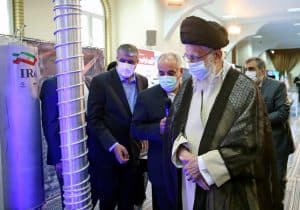
Iranian Supreme Leader Ali Khamenei touring a nuclear site and inspecting IR-6 advanced centrfuges | Khamenei.ir
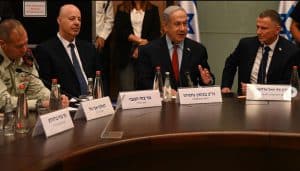
Israeli Prime Minister Netanyahu speaking in front of the Knesset’s Foreign Affairs and Defense Committee | June 13 (Photo: Haim Tzah, GPO)
- The Biden administration has made it clear from the moment the President has come into office that the US will not allow Iran to obtain nuclear weapons. Its approach to the issue, however, prioritizing diplomacy and trust-building steps over confrontation and credible military threat, has not served the US interests as Iran continued to enrich record levels of uranium. Lengthy talks between the parties have not been able to meet each other’s basic requirements, with the Iranian regime considering the military nuclear issue as a top priority. For this reason, the original JCPOA (Iran Nuclear Deal) from 2015 was unable to assure Iran will denuclearize, and in fact provided international legitimacy for Iran to continue its enrichment and break free from any and all internationally-imposed restrictions by 2031. Further evidence for the limitations of this approach lie in the abandoning of the Iranian “strategic patience” after the US unilateral withdrawal from the agreement (2018), avoiding to resume enrichment up until the Biden administration came into office. The President admitted last December that the deal was “dead”, and negotiations aiming at renewing it before the 2022 midterm election went off the rails, but if reports are to be believed, informal and unwritten exchanges between the US and Iran will now substitute the US official policy, procrastinating the moment of decision and allowing Iran meanwhile to accumulate more “cards” to maximize its achievements.
Russia’s Bonding with Iran: An antithesis and counterforce to the West’s regional coalition
- Israeli Prime Minister Netanyahu provided a rare glimpse into the usually-discreet relationship between the Israeli and Russian governments, revealing during the meeting of the Knesset’s Foreign Affairs and Defense Committee that Israel expressed its protest to the Russian government on its increasingly tight military cooperation with Iran, as well as expressing its concern that Moscow could provide Tehran advanced weapon systems. Netanyahu reiterated a point often characterizing his regard to Israeli-Russian relationship, that the two governments engage in a silent dialogue and speak candidly and openly. Netanyahu further stated that “we do not know with what currency Russia pays Iran for the military aid it provides.” These statement were leaked from the meeting and were not part of Netanyahu’s statement to the press. (Walla News)
- Minister of Strategic Affairs Ron Dermer, formerly the Israeli Ambassador to the Washington and is considered one of Prime Minister Netanyahu’s closest and most long-serving associates, said in an interview as part of the American Jewish Committee (AJC)’s Global Forum 2023 that Israel is “concerned about that partnership” – i.e. between Russia and Iran, as well as “what systems Russia could provide Iran and it could be potentially dangerous for us.” Minister Dermer further revealed the considerations behind Israel’s prudence around the Ukrainian issue and specifically the provision of advanced weapon systems to Ukraine, saying Israel fears such weapons “could fall into the wrong hands”, in case the Russians obtain them and transfer them to the Iranians, posing a potential risk for Israel: “tomorrow it falls into Russian hands, it ends up in Iranian hands, and then the Iranians reverse engineer that weapon system and then all of a sudden it becomes a danger for millions of Israeli citizens.” (June 12)
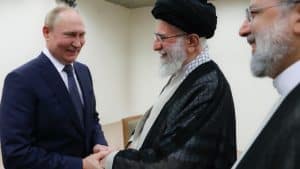
Russian President Vladimir Putin in a meeting with Iran’s Supreme Leader Ali Khamenei and President Ibrahim Raisi during a trip to Iran on July 2022 | Khamenei.ir
Iran claims to have developed its first hypersonic missile, dubbed Fattah: “400 seconds to Tel Aviv”
- On June 7, Iranian authorities unveiled the “Fattah” hypersonic missile, a notable development of their missile-related capabilities and a potentially new, worrisome upgrade to their already vast stockpile of missiles. Hypersonic missiles travel more than 5 times the speed of sound, and carry a GPS-guided component that allows them to avert air defense systems by changing course during their flight. Last November, when Iranian officials touted this achievement yet didn’t unveil the missile, road signs and state press in Iran stressed this missile could “reach Tel Aviv within 400 seconds.”
- Iranian media underscored this achievement, that if true, positions Iran among a small group of nations with the technological knowledge needed to create such a weapon. It has also collected a series of statements on Israeli press and by senior Israeli officials, boasting what it interprets as grave Israeli concern by this development.
- Iran may have received aid from Russia, being that Iran aided Russia in its fight against Ukraine. Russia has already claimed to have used such missiles during its war in Ukraine.
- A week after this revelation, Israeli Rafael Systems that is involved in military R&D revealed its newly-designed “Sharp Sling”, capable of intercepting hypersonic missiles, due to be exhibited during the Paris Air Show.
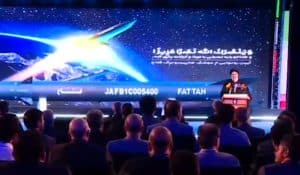
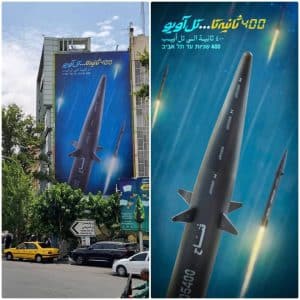

Iranian claim of developing a new “hypersonic” missile dubbed Fattah, traveling at “14 times the speed of sound”, was met with Israeli Rafael’s revelation of a newly-developed air defense system, “Sharp Sling” able to intercept hypersonic missiles | Iranian media touted the concern voiced by senior Israeli officials and the Israeli media | Iranian authorities boasted on road signs that the missiles can “hit Tel Aviv within 400 seconds” | Iranian President Ibrahim Raisi revealing the alleged “hypersonic” missile (Iranian media, Rafael)
Israeli-Saudi Normalization? Secretary Blinken met MbS and updated PM Netanyahu
- US Secreatry of State Anthony Blinken met Saudi Crown Prince Mohammed Bin Salman (commonly known as MbS) in Riyadh, later calling Israeli Prime Minister Netanyahu to update him on the details of that meeting. (June 8)
- PM Netanyahu said in an interview to Sky News (UK) that he “can’t guarantee” peace with Saudi Arabia and that “it is too early to tell” whether it will be possible, but reiterated his hope for such an agreement, saying “our hand is extended to all Arab states, and certainly to Saudi Arabia.” He continued, “we have great opportunities to advance the peace in our region, peace between our two countries the the well-being of our peoples. … Saudi Arabia would be a quantum leap forward” because of the prospect it will fast-track Israel’s peace with the Arab and Muslim world as a whole as well as “help us solve the Palestinian-Israeli conflict”. He said Israeli-Saudi peace was “one of the great goals that I set for myself coming back to office” – alongside blocking Iran, adding that “the two are interrelated”. (June 9)
- Meanwhile, Saudi Foreign Minister Faisal Bin Farhan said in a press conference in Riyadh after meeting Secretary Blinken that “no normalization with Israel will be possible without resolving the Palestinian issue”, adding that any normalization that lacks reference to it will have “limited character”. It is to be noted that similar messages regarding the conditioning of Israeli-Arab peace on addressing the Israeli-Palestinian conflict had also been made by leaders from the UAE, Bahrain, Morocco, and Sudan prior to the Abraham Accords, the series of peace treaties they signed with Israel in 2020 with no notable steps in the Palestinian arena.
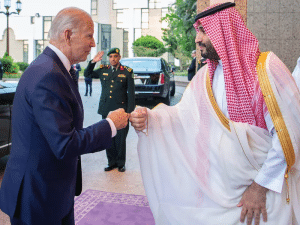
US President Joe Biden and Saudi Crown Prince Mohammed Bin Salman (“MbS”) meet in Jeddah, Saudi Arabia | July 2022 (Saudi Press Agency)
Terror attack on the Israeli-Egyptian border: investigation resulted in the dismissal of a Division commander
- On June 3rd, an irregular incident occured on the Israeli-Egyptian border, two countries with a peace treaty albeit whose border remains a hotspot for human, weapon and drug smuggling, an Egyptian policeman penetrated into Israeli territory through a breach in the border fence. He advanced several kilometers by foot to a military post he knew well given his day-to-day role as a policeman patrolling the border, then shot and killed two IDF soldiers while they were carrying out a guard shift, between Mount Sagi and Mount Harif in the Negev desert. The two were found several hours after the attack took place, in an area with scarce military presence and attention, after not responding to their commanders on the network. When found, a manhunt was initiated inside Israeli territory, leading to a further exchange of fire where the gunman managed to kill another IDF soldier and was subsequently taken down.
- Both Israeli and Egyptian governments announced that they are keeping in close touch to mutually investigate this irregular incident, underscoring the importance of their bilateral relations.
- Prior to the event, a 1.5 million NIS worth of drug smuggling was intercepted along the border. The Egyptian soldier’s ties to terrorism are under investigation.
- In the IDF, a division commander was dismissed, an irregular and notable step following the multiple breaches found in the IDF investigation into the attack, and several other commanders were rebuked.
Chinese-Palestinian “Strategic Partnership”: Another sign of China’s willingness to become a political actor in the region
- On June 14, China announced the formal creation of a “strategic partnership” with the Palestinian Authority during a visit by its President Mahmoud Abbas to Beijing. During the visit, Abbas expressed his support for China’s position vis-à-vis its Muslim minority population and on the issue of Taiwan. The visit reflects the Palestinian assessment that the United States is getting weaker by the day, yet despite the problematic Palestinian positions and their relationship with Russia, Washington will remain committed to them, and their actions will carry no price tag. China, meanwhile, will continue to strengthen its status in the region as an influential actor.
- Through such partnerships, China hopes to strengthen its diplomatic image and assist large Chinese companies in negotiating infrastructure investments connected to the nation’s “Belt and Road Initiative.” Abbas’ arrival follows the recent meeting in China between Iran and Saudi Arabia, which led to the renewal of diplomatic ties between these Middle Eastern adversaries, boosting China’s influence in the area.
THE MONITOR: H1 June 2023 in numbers
TERROR ATTACKS
Israelis
3 soldiers killed in a terror attack on the Egyptian border
4 soldiers injured in car ramming and drive-by shooting attacks in Samaria
1 citizen killed in a terror attack in Samaria
1 citizen injured in a drive-by shooting attack in Samaria
In detail
- June 1 | Neveh Tzuf, Judea and Samaria | Israeli forces serving in the area were fired upon by a Palestinian gunmen. In returning fire, Israeli soldiers mistakenly fired at a passing car, wounding Palestinian Haitham Tamimi and killing his 2-year-old son Mohammed
- June 3 | 3 Israeli soldiers killed in Egypt border attack | Egyptian policeman penetrated into Israeli territory through a breach in the border fence, then shot and killed two IDF soldiers while they were carrying out a guard shift, subsequently killing another soldier who was part of the IDF manhunt squad
- Staff Sgt. Ori Yithak Iluz, 20
- Sgt. Lia Ben Nun, 19
- Staff Sgt. Ohad Dahan, 20

Three Israeli soldiers were killed in an irregular terror attack carried out by an Egyptian policeman along the Israeli-Egyptian border
- June 5 | Palestinian village of Huwara, Judea and Samaria | 2 IDF soldiers were hit by a car by a terrorist. Terrorist was caught and a knife was found in his car.
- June 6 | Hawara | An Israeli driver was shot nearby the town. According to the victim’s testimony, he was shot at while driving, and preferred to continue driving to a safe place. A total of 12 bullets hit his car. This incident occurred just one day after two soldiers were injured in a car ramming attack in the same area.
- June 7 | Palestinian plotter arrested | Palestinian policeman Alaa Khaled Qatto arrested in conspiracy to assassinate Samaria council head Yossi Dagan.
- June 13 | Near Yaabed, Northern Samaria | 1 civilian and 4 IDF soldiers injured in a drive-by shooting in Judea and Samaria. There was a similar attack exactly two weeks ago that may have been carried out by the same individual

A drive-by shooting attack took place near the Reihan checkpoint, northern Samaria, injuring one Israeli civilian and three soldiers (Photo: Samaria Regional Council)
On the Palestinian side
- June 8 | Ramallah | The IDF demolished a Ramallah home of a Palestinian terrorist who was charged with a bombing in Jerusalem last year. While the house was being destroyed, Palestinians threw rocks and firebombs to which IDF soldiers responded with live fire. Six Palestinians were injured in the riot, three injured by gunshot. >>
- June 13 | Balata refugee camp, adjacent to Nablus | Israeli forces entered the refugee camp in order to arrest suspects as part of a counterterrorism operation. One Palestinian man was reportedly killed, two wounded. >>
- June 15 | Nablus Refugee Camp | Israeli forces entered the area and demolished the house of the terrorist who murdered soldier Ido Baruch last year in a drive-by shooting attack. House demolitions of terrorists is a step deemed by the Israeli government and the Ministry of Defense as an effective deterrence measure and deemed legal by the Israeli Supreme Court. During the activity, Palestinian militants rounded the force and threw stones as well as shot at the soldiers, who fired back.
